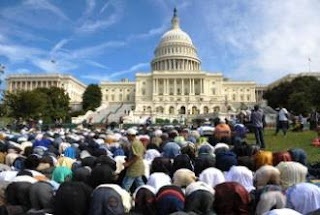 Aims to turn Paris into EU capital of Islamic finance
Aims to turn Paris into EU capital of Islamic finance.........
PARIS : As France debates whether to ban the burqa, the government is leading a drive to attract billions in investment from Muslim countries by turning Paris into the European capital of Islamic finance.
The French parliament this month has approved changes to legislation to allow Islamic "sukuk" bonds to be issued and the Qatar Islamic Bank has applied to be the first such bank to open in France.
Home to Europe's biggest Muslim minority, France is hoping to unseat London as the European hub for Islamic banking, offering products that comply with Sharia law and meet the needs of big investors mostly from Gulf countries.
But the drive is raising hackles, with some opposition politicians accusing the government of undermining France's much prized secularism to accommodate wealthy interests.
"When rich Muslims are concerned, we welcome them. But when they are poor, we put them on planes and deport them. This is all very upsetting," said Socialist deputy Henri Emmanuelli.
After failing to garner enough votes to derail the bill, the Socialist opposition is challenging the legality of the new legislation on Islamic finance before the Constitutional Council.
"We must not allow principles of Sharia law, or the ethics of the Quran to be introduced into French law," said Emmanuelli.
Under Sharia law, making money from money such as charging interest is not permitted and investment in companies involved in alcohol, gambling and tobacco is strictly off limits.
"Sukuk" bonds
Much of the debate has focused on opening up the French market to "sukuk" bonds, which are asset-based and do not pay interest. Investors receive coupons corresponding to part of the profits earned by the asset underpinning the bond.
Economists argue that money raised through Islamic finance could help spur France's nascent recovery with tools that are seen as financially sounder than the high-risk derivatives that led to the 2008 global meltdown.
Elyes Jouini, an author of a report presented to the government last year, estimates that France could tap into 120 billion euros in capital from Islamic finance by making adjustments to its tax and banking laws.
Only €7 billion of those would be raised domestically among France's five million Muslims.
"There are extremely important financial reserves in Gulf countries and southeast Asia and these countries are ready to invest anywhere but they have specific rules in terms of ethics and in terms of the choice of investment," said Jouini.
"If France wants to attract this capital to its economy, it must offer the possibility for these investors to do so according to the rules of Islamic finance," he said.
Fear of the unknown
Finance Minister Christine Lagarde and Central Bank governor Christian Noyer are to address a major conference in Paris this week that could yield some announcements on promoting Islamic finance in the French economy.
France's far-right National Front has denounced Islamic finance as a "community-based peril" resulting from immigration.
Jouini said opposition to the changes stems from "fear of the unknown."
"The term Islamic is confused with Islamist, the term Sharia raises fears because some think of women forced to cover themselves, the word fatwa raises fears because some think of Salman Rushdie, but a fatwa is nothing more than a decree," said Jouini.
"Islamic finance draws from the ethical principles of Muslim law but it obviously obeys Republican laws. It is not outside the boundaries of legality or civil society," he said.
The drive to open up to Islamic finance came as a parliament task force was looking at measures to ban the wearing of the full Islamic veil in France, reviving controversy over Islam's place there.



